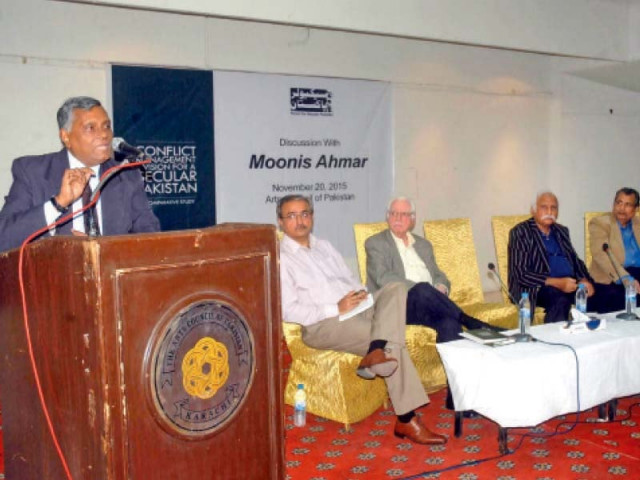Towards tolerance: ‘There is a dire need to redefine secularism in Pakistan’
University of Karachi faculty of social sciences dean Dr Moonis Ahmar launches his book

Prof Dr Moonis Ahmar addressing the audience at the launching ceremony of his book, Conflict Management and Vision for a Secular Pakistan-A Comparative Study, at the Arts Council on Friday. PHOTO: IRFAN ALI/EXPRESS
He was speaking at the launching ceremony of his book, Conflict Management and Vision for a Secular Pakistan-A Comparative Study, at the Arts Council on Friday. The event was organised by the Society of Secular Pakistan.
"Islam and secularism are not the same," he said. Giving references to some other books on secularism, Dr Ahmar said that we need to spread awareness about secularism among the citizens of the country, especially the university-going students.
Is a secular Pakistan the answer to our problems?
Pakistan has one of the largest youth bulge, as among the 200 million population more than 50 per cent people are young. "We, as teachers and elders, need to explain the young populace what secularism is and how it should be dealt with," he said warning that if such measures are not taken then terrorism, intolerance, religious conflicts will never end in Pakistan.
The problem that we face while trying to spread the message of peace is that no one wants to listen and understand it, he claimed while talking to the audience.
"We have started tolerating what we should not, while we do not tolerate what we should," he explained how people are becoming indifferent towards injustice and corruption. The young population of the country needs to realise that religion should not be used as a political tool, he claimed. To achieve a more tolerant society, we must encourage other citizens to read, he added.
Extremism has altered the minds and lives of many people, said Muqtida Mansoor, book columnist, while reading out his article that he wrote after reading the book. "In our society, we have made it a common practice to taunt people from different religions and insult them for their beliefs." Speaking about the political implications of extremism, author Babar Ayaz pointed out that the history of the countries' elections show that no religious party has been able to gather more than 10 per cent votes. "If Pakistan becomes a secular state then our political parties will have a very different structures and ideologies."
Supreme Court asks if parliament can declare Pakistan a secular state
Commenting on the decreasing research culture, Dr Ahmar pointed out that since 1947 there has been no proper research or study which gives an overview of the conflicts and problems in the country.
"More than 80 per cent of the researches on our society are conducted by foreign researchers."
Dr Ahmar also expressed his desire of translating his book in Urdu, Pashtu, Balochi and other regional languages. He explained how he has taken three case studies in his book from India, Turkey and Indonesia to better explain the concept of secularism.
Published in The Express Tribune, November 22nd, 2015.



















COMMENTS
Comments are moderated and generally will be posted if they are on-topic and not abusive.
For more information, please see our Comments FAQ